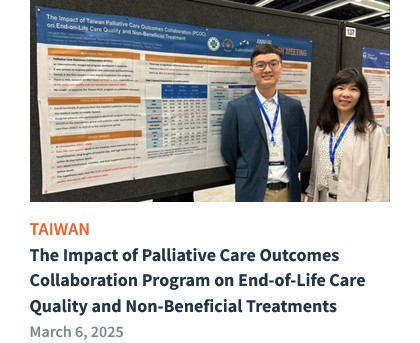

臺大公衛學院為加強宣導本院教師之學術成果,進而提升本院國際能見度,由董鈺琪老師與碩班吳家鈞同學之共同撰寫下列文章投稿至ASPPH Friday Letter.
該文目前已刊登於 ASPPH Friday Letter, March 7, 2025
篇名:
The Impact of Palliative Care Outcomes Collaboration Program on End-of-Life Care Quality and Non-Beneficial Treatments
AUTHOR
Jia-Jyun Wu (博士班健管組吳家鈞同學), Yu-Chi Tung ✉️ (本所專任董鈺琪教授)
JOURNAL Supportive Care in Cancer
PUBLISHED 2024.08.06
Abstract
Purpose
Palliative Care Outcomes Collaboration (PCOC) is an internationally recognized program developed in Australia. Taiwan became the first country in Asia to implement PCOC in 2020. There is little research on the impact of PCOC in Asia. We sought to examine the effects of the Taiwan PCOC on palliative outcomes.
Methods
The study analyzed the impact of PCOC with a retrospective cohort design. The hypotheses were that PCOC could improve end-of-life care quality and reduce non-beneficial treatments. The study enrolled patients with terminal illnesses from the inpatient palliative care units. General characteristics of participants were collected. Exclusion criteria were people without a diagnosis of terminal illness, aged 20 and younger, or with missing data.
Results
The study collected 1,121 patients, 555 in the PCOC comparison group and 566 in the intervention group. Most patients were with terminal cancer (88.58%). The rates of hospital deaths in the PCOC and non-PCOC groups were 68.73% vs. 74.95% (P = 0.021). A multivariable logistic regression model, adjusting for age, sex, Charlson comorbidity index, and terminal cancer status, was utilized. The PCOC intervention significantly decreased hospital deaths (OR = 0.26, 95%CI 0. 16-0.41, P < 0.001).
Conclusions
PCOC in Taiwan significantly reduced hospital deaths among terminal patients, possibly due to effective symptom management and improved communication via the use of patient-reported outcomes. Further research is needed to support PCOC implementation in Asia and investigate collaboration programs' impact on end-of-life care quality and non-beneficial treatments.
Keyword
End-of-life care; Non-beneficial treatment; Palliative care; Patient-reported outcome measures.
